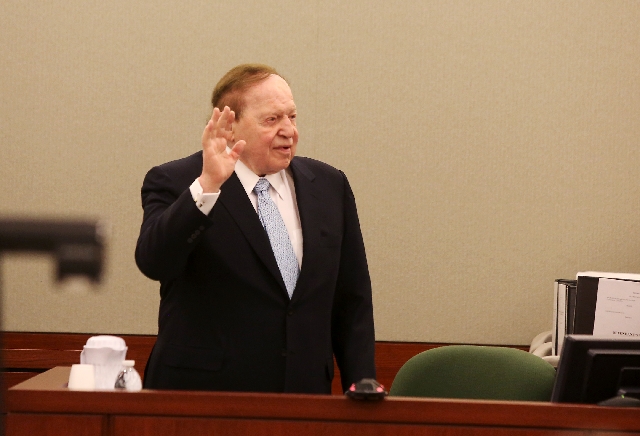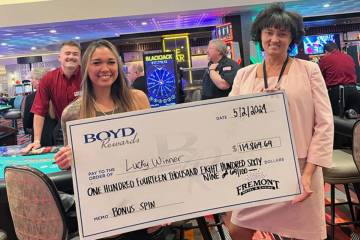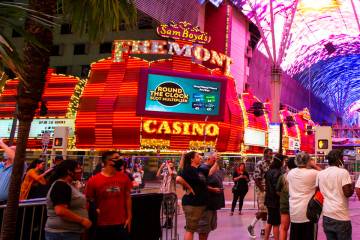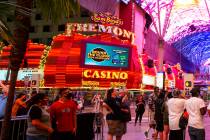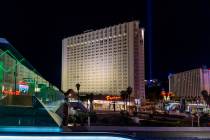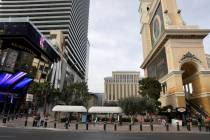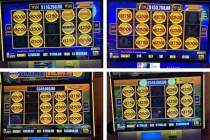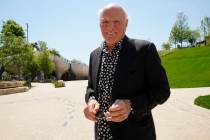Adelson appears in contract lawsuit; lawyer asks for mistrial
It took one hour of Sheldon Adelson’s testimony Thursday for the Las Vegas Sands Corp. chairman and CEO to provoke opposing attorneys to demand a mistrial.
To burnish his long-standing convention industry credentials to the jurors, Adelson reached into a small black bag visible only to Clark County District Judge Rob Bare and pulled out what he said were program guides from shows that he had produced in the 1970s and 1980s. Even as attorney John O’Malley, representing former Sands consultant Richard Suen, objected because the catalogs were never included in the now-closed evidence list, Adelson placed more on the edge of the witness box.
Bare rejected the request to restart with a new jury, but instructed jurors to disregard what they saw. He said the approximately 80 seconds between O’Malley asking Adelson what the papers were and his objection showed that O’Malley “acquiesced, at least for a short period of time, in the event that occurred” and even appeared to help stack the guides at one point.
The court appearance by one of the nation’s richest men, a lightning rod of criticism from Democrats because of his massive campaign contributions to Republican candidates, came in a dispute over an unpaid bill.
Suen, a Hong Kong businessman who first met Adelson in mid-2000, contends his guidance and connections with the Chinese government helped Sands break into the Macau, the world’s largest gaming market.
He maintains Adelson promised a fee of $5 million plus 2 percent of net profits until 2022.
He demands $328 million based estimated profits over two decades. Sands contends Suen’s efforts contributed nothing to winning a sub-concession from another company and has refused to pay anything.
It is the second time the issue has been to trial. A jury awarded Suen $43.8 million five years ago, but the verdict was overturned by the Nevada Supreme Court in 2010.
Adelson’s display of the program guides came as he depicted events in late 2001, when the Macau government decided to end a long-standing gaming monopoly held by Stanley Ho and invite competition. Officials in the former Portuguese colony also wanted to build a convention and business meeting hub.
Suen, Adelson said, then offered to help lobby and conduct public relations to help Sands win a license.
“We had the qualifications to apply,” Adelson said. “(Suen said) ‘I will tell the government what a great convention guy you are.’ With all due respect, I don’t think that was necessary.”
At that point, he pulled out the programs to underscore his point.
Another Suen attorney, James Pisanelli, said the display of improper evidence tainted the jury beyond repair.
“What we have here cannot be cured simply by an admonition to this jury to forget about it,” he said.
He added that Adelson’s experience in lawsuits made him adept at “taking over the courtroom.”
Sands attorney Richard Sauber said he counseled Adelson against bringing in items not formally admitted as evidence.
“I didn’t know he had (the programs) in his brief case,” he said.
Bare himself said he initially did not know what Adelson had in his bag, guessing at medical supplies or tissues.
Beyond the courtroom theatrics, testimony largely covered the same ground as the first trial.
Adelson said his brother, Leonard Adelson, brought him Suen to the company in mid-2000.
Adelson contended that Suen promised to work his connections to obtain the gaming license at a time when Macau was still a monopoly and no one knew whether the government would continue that policy or open the doors to competition. Once the government asked for outside proposals in October 2001, Suen’s help became unnecessary.
On several occasions, Adelson gave lengthy answers to questions that O’Malley thought deserved only a “yes” or “no.” He also sprinkled in references to the poverty of his youth.
O’Malley, however, played several video clips of past courtroom and deposition testimony, highlighting different answers then and now.
Adelson recounted that he called former U.S. House of Representatives Majority Whip Tom DeLay, R-Texas, in July 2001 about a congressional resolution opposing Beijing as the site of the 2008 Olympics. Adelson did that after Chinese officials expressed concern that the resolution might affect their chances of landing the Games.
He learned that the procedural matters would prevent a vote on the resolution until after the Games were awarded, making it moot in any event.
Nevertheless, he said, former Sands President William Weidner claimed credit for stalling the vote to China’s ambassador to the United States.
Adelson said he did not want to make that claim but placed Weidner’s message “under the category of exaggeration, not misrepresenting, not lying.”
But in a deposition given in October and shown Thursday, Adelson had told Suen’s lawyers that “Bill turned out to be a liar and he misrepresented. He wanted me to misrepresent with him.”
Adelson’s testimony will continue today, with the trial scheduled to go into early May.
Contact reporter Tim O’Reiley at toreiley@reviewjournal.com or 702-387-5290.




